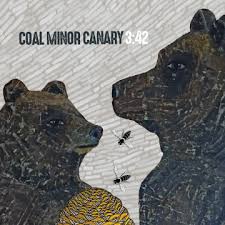
 I’m down with the legendary Quentin Crisp. The great man once said that “There is no need to do any housework, because after four years the dirt doesn’t get any worse.” I agree wholeheartedly. Just what is it with dust? You wipe it up. Then, a few days later, you have to do it again. Where does the bloody stuff come from? Crisp also said: “I never spend time doing anything today that I’ll have to do tomorrow.” What a great philosophy. Perhaps if I was a Canary flying through the trees, I would be liberated from the mundane task of housework. David Hage is a singer-songwriter from North Eastern Pennsylvania who records under the moniker of Coal Minor Canary. He knows a thing or two about dust: coal dust. He describes his tunes as being “dusty, black diamond music.”
I’m down with the legendary Quentin Crisp. The great man once said that “There is no need to do any housework, because after four years the dirt doesn’t get any worse.” I agree wholeheartedly. Just what is it with dust? You wipe it up. Then, a few days later, you have to do it again. Where does the bloody stuff come from? Crisp also said: “I never spend time doing anything today that I’ll have to do tomorrow.” What a great philosophy. Perhaps if I was a Canary flying through the trees, I would be liberated from the mundane task of housework. David Hage is a singer-songwriter from North Eastern Pennsylvania who records under the moniker of Coal Minor Canary. He knows a thing or two about dust: coal dust. He describes his tunes as being “dusty, black diamond music.”
Hage hails from Dallas, Pennsylvania. Dallas is but a Canary’s flight from Wilkes-Barre, the place where in 1808 Judge Jesse Fell became the first person to successfully burn anthracite in his fireplace, taken from one of the local mines. Although he values his history and heritage, Hage is also conservation-ally minded, and worries about the various diseases and loss of meadow-like habitat that has been the misfortune of bees and other flying insects. These disasters, according to scientists, spell an oncoming “ecological Armageddon.” The abundance of flying insects has fallen by three-quarters over the past 25 years.
Another person fond of bees was that irrepressible gentleman in the coal-black velvet suit, Erik Satie. (I think Crisp and Satie would have had great conversations. They both hated housework.) When he wrote 3 Gymnopedies Satie said that the three works were akin to looking at a sculpture in a gallery, and that each composition was like walking around the sculpture and seeing it from a different angle. Perhaps this was Hage’s intention, as the selection of songs on the 3: 42 EP are quite similar in form and emotion. If there were no breaks in-between songs they would segue quite beautifully as one total work.
Across the six tracks, Hage sounds upset: distressed and disconcerted about the poor bees and inconsolable because his partner has moved to Texas. This lachrymose selection of heart-rending songs, make one feel that David would enjoy the comfort of a nice hug from Dermot, or that classic line from Louis Walsh: “I’m sorry, it’s not good news… It’s GREAT NEWS! YOU’RE GOING THROUGH TO THE LIVE SHOWS!!!” David has been playing a lot of gigs recently and is available for bookings through his website www.coalminorcanary.com He says that the tone and anguished content of these songs illustrate the emotions he felt when his most recent relationship ended and he had to adapt to a new aloneness. David says: “Love is like honey and the bee’s sting is similar to the pain your love’s absence brings in the process of tasting its sweetness.”
Fractured Shadows has a memorable melody, with David wailing “I wonder if you’re ever coming back?” along with some gorgeous cello from David’s compadre Dan King from A Fire of Friends, whose accompaniment throughout this EP adds an extra dimension to David’s enticing and distinctive “progressive finger-picking guitar style” that David was taught by his Uncle Warren, which “merges traditional Travis picking” and also features “altered tunings; you play the guitar melodically and percussively.”
The American War of Independence in 1812 led to British coal imports being stopped and coal from the North Eastern Philadelphia region being exported to New York and other cities as a “smokeless” home-heating fuel which led to a boom. The mining industry in Pennsylvania declined after World War 2, but global-warming-denier-in-chief Donald Trump promised during the Presidential Election campaign, that he would get the Pennsylvania mining industry functioning again to peak output.
Let’s hope that doesn’t happen: given the news that atmospheric levels of CO2 are the largest that they have been for 8,00,000 years, as well as pushing the temperature way up past the 2 degrees Celsius as decided by the ParisAgreement of 2015, which has doomed our planet to irreversible extreme weather conditions of drought and flooding on a scale the world has never seen: just imagine the dusting that we’ll all have to do, wiping up that sooty residue on a daily basis.


